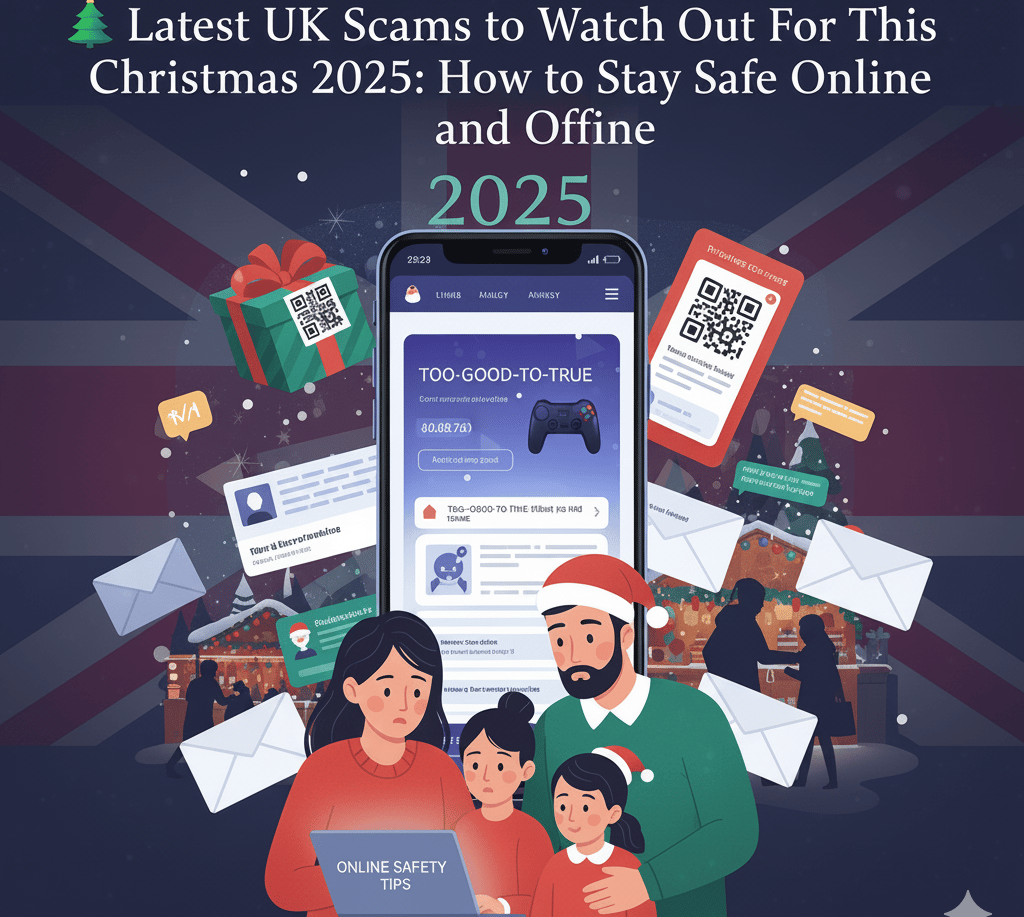🎄 Latest UK Scams to Watch Out For This Christmas 2025
SCAM ALERT
IT-UK Tech Team
10/28/20253 min read


🎄 Latest UK Scams to Watch Out For This Christmas 2025: How to Stay Safe Online and Offline
Keywords: UK scams Christmas 2025, delivery scams UK, purchase fraud, impersonation scams, festive scams, online safety tips
🕵️♂️ Introduction: The Festive Season – and a Fraudster’s Favourite Time
As Christmas approaches, millions of people across the UK are hunting for the best deals, ordering gifts online, and donating to good causes. Unfortunately, fraudsters are doing the same — but their goal is to cash in on your generosity, distraction, and holiday rush.
According to UK Finance, scammers could steal over £100 million during the 2025 festive season alone — mostly through online shopping scams, fake parcel messages, and impersonation fraud.
Here’s a complete guide to the latest scams targeting UK consumers right now — and how you can protect yourself, your family, and your business this Christmas.
🚨 The 6 Most Common Scams Hitting the UK Before Christmas
1️⃣ Delivery and Missed-Parcel Scams
These are the most widespread scams in the UK during the festive period. You’ll receive a text or email saying something like:
“We tried to deliver your parcel but you weren’t home. Please pay £1.50 to rearrange delivery.”
The link then takes you to a fake Royal Mail, DPD, or Evri website that steals your details or installs malware.
🛡️ How to protect yourself:
Don’t click links in messages or emails you weren’t expecting.
Go directly to the courier’s official app or website.
Royal Mail, DPD, and others never ask for small payments by text.
2️⃣ “Hi Mum / Hi Dad” WhatsApp Impersonation Scams
Fraudsters pretend to be your child or friend using a new number and send messages like:
“Mum, I lost my phone at the Christmas party — I need money urgently!”
Once you respond, they’ll pressure you to send money to a new “safe account”.
🛡️ Stay safe:
Always call the person back on their old number before sending anything.
Be cautious of emotional urgency — it’s a major red flag.
Report the number on WhatsApp and forward suspicious texts to 7726.
3️⃣ Fake Online Shopping Deals
From super-cheap tech gadgets to impossible Black Friday offers, fake e-commerce websites and Facebook ads surge at this time of year.
Scammers create professional-looking sites that take your payment — but the goods never arrive.
🛡️ Protection tips:
Check the retailer’s reviews and URL carefully (watch for small spelling differences).
Use credit cards instead of bank transfers for buyer protection.
Avoid deals that look too good to be true — they usually are.
4️⃣ Charity and Christmas Appeal Scams
Scammers exploit the season of giving by setting up fake charity websites or sending phishing emails pretending to be from real organisations like the Salvation Army or Cancer Research UK.
🛡️ Protect your generosity:
Verify charities on the Charity Commission register before donating.
Don’t give through links in emails or social media — go directly to the charity’s official website.
5️⃣ Romance and Loneliness Scams
During the holidays, people can feel lonely — and scammers know this. They form online relationships, gain trust, and then ask for “help” with a financial emergency.
🛡️ Stay cautious:
Never send money or share financial info with someone you’ve only met online.
Talk to friends or family if you feel pressured.
Report romance scams to Action Fraud.
6️⃣ Bank, HMRC, and Government Impersonation Scams
Scammers pose as your bank, HMRC, or energy company, saying your account will be “frozen” unless you verify your details or make a payment.
🛡️ How to spot them:
Official institutions never ask for passwords, PINs, or payment by text/email.
Log in directly to your online banking or government account to verify any alerts.
Report suspicious calls or texts immediately.
🧠 Why Scams Increase at Christmas
More online shopping: Millions of extra transactions = more opportunity for fraudsters.
Stress and distractions: Busy shoppers are more likely to click quickly or ignore warning signs.
Social engineering: Scammers exploit emotion — urgency, excitement, or fear.
New devices: Many people activate new phones or laptops, sometimes without full security settings.
✅ 10 Simple Ways to Protect Yourself This Christmas
Pause before paying or clicking.
Check the sender’s address or phone number carefully.
Use 2-factor authentication (2FA) wherever possible.
Keep your software and antivirus up to date.
Pay with credit card — more protection for goods and services.
Check bank statements regularly for strange transactions.
Educate family members, especially older relatives.
Don’t share personal info unless absolutely sure who you’re speaking to.
Use strong, unique passwords.
Report scams to Action Fraud or by texting 7726.
🧩 Final Thoughts
The festive period should be a time for family, celebration, and giving — not for getting scammed.
Take a few extra seconds to double-check before clicking, sending money, or sharing information.
A moment of caution today could save you hundreds of pounds and endless stress tomorrow.
Stay safe, stay alert — and have a scam-free Christmas 2025 🎁
✳️ About IT-UK Tech Team
At IT-UK Tech Team, we help UK businesses and consumers stay secure online — from cybersecurity advice to device protection and digital support.
💻 Visit our website or call 01494 240083 / 07963 209527 for expert help this holiday season.
APPOINTMENTS LINE
Email: support@ituktechteam.co.uk
+44-1494 240 083 or 07963209527
Purchases via Amazon links support this site at no additional cost to you
Expert advice. Very good deals.
